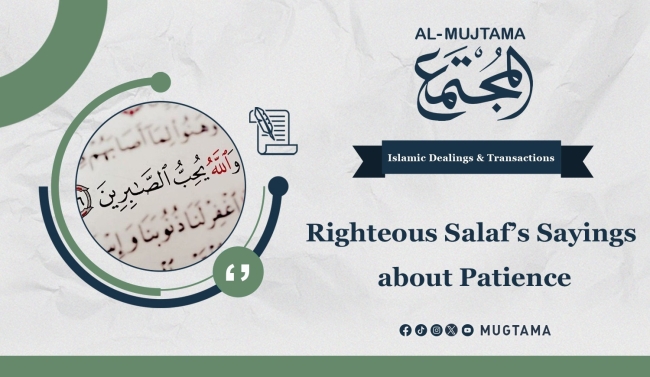Righteous Salaf’s Sayings about Patience
Patience is a noble virtue in Islamic Sharia, repeatedly encouraged to be adopted and practiced. Those who are patient are among the best of servants, as Allah has praised them in various ayahs in His Book. Due to the significant rewards and benefits associated with this virtue, it is not easy for the human soul to embody patience without numerous attempts, striving, and training to overcome the urge for revenge and other desires.
First, it’s important to define patience, to understand its essence, purpose, and goal. Patience, as defined by Ibn Qayyim in his book “Uddat as-Sabirin,” is restraining the soul from panic and discontent, holding the tongue from complaining, and controlling the limbs from slapping the cheeks, tearing the clothes, and similar actions.
Moreover, patience is Allah's advice to all His believing servants. Allah addresses His servants clearly in His noble Book, advising them to be patient and informing them of the reward they will receive if they embody this virtue. Allah says, “And We will surely test you with something of fear and hunger and a loss of wealth and lives and fruits, but give good tidings to the patient, who, when disaster strikes them, say, 'Indeed we belong to Allah, and indeed to Him we will return.' Those are the ones upon whom are blessings from their Lord and mercy. And it is those who are the [rightly] guided.” (Al-Baqarah: 155-157)
Given the importance and status of patience, the archives of the righteous Salaf and the first generation of this Ummah are not devoid of sayings that encourage adopting and embodying patience. Therefore, we will mention a small portion of what has been narrated from the righteous Salaf about the importance of patience and adopting it to join the ranks of the patient.
We begin with Umar ibn al-Khattab (may Allah be pleased with him), who said about patience: “The best life we attained was through patience. If patience were among men, it would be noble.”
Consider what Ali ibn Abi Talib (may Allah be pleased with him) said: “Indeed, patience in faith is like the head to the body. If the head is cut off, the body perishes.” Then he raised his voice and said: “Indeed, there is no faith for one who has no patience. Patience is a mount that does not stumble.”
Let's ponder the concise statement of Abdullah ibn Mas'ud (may Allah be pleased with him) who summarized it by saying: “Patience is half of faith, and certainty is the whole of faith.”
Here is the master of ascetics, Al-Hasan Al-Basri, telling us about patience: “Patience is a treasure from the treasures of goodness, Allah does not give it except to a noble servant.”
Consider what Umar ibn Abdul-Aziz said: “Allah does not bestow a blessing upon a servant and then take it away, compensating him with patience, except that what He compensates him with is better than what He took away.”
Said ibn Jubayr said: “Patience is the acknowledgment of the servant to Allah for what has afflicted him, and his reckoning with Allah and hope for His reward.”
As for Shaqiq al-Balkhi, he said: “Whoever complains about a misfortune to other than Allah will never find the sweetness of obedience to Allah in his heart.”
Here is Yunus ibn Yazid's question when he said: “I asked Rabi’ah ibn Abi Abdur-Rahman: What is the ultimate limit of patience? He said: 'It is that the day you are afflicted with a misfortune is like the day before you were afflicted.'”
As for Al-Hariri, he said: “Patience is not to differentiate between the state of blessing and the state of trial with tranquility in both.”
We conclude with Abu Ali al-Daqqaq, who said: “The patient ones triumphed with the honor of both worlds because they gained Allah's companionship, for Allah is with the patient.”
-------------------------------------------------------------


